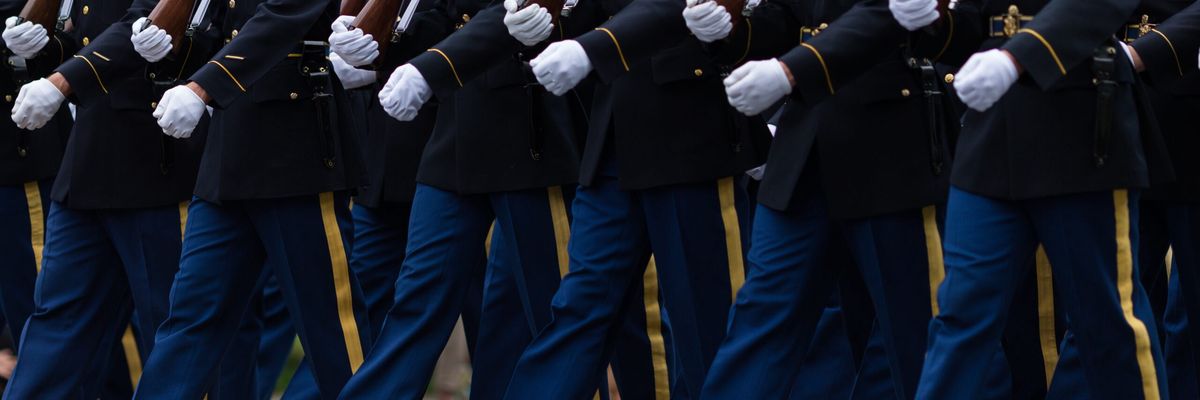Members of Congress have obtained a list of former military officers who have done paid work for foreign governments since 2012. It may be a surprise — or not — that the list includes 77 senior officials (Generals and Admirals), and that the countries that employed them represent some of the most repressive governments in the world (Saudi Arabia, Egypt and the UAE).
Sens. Elizabeth Warren (D-Mass.) and Charles Grassley (R-Iowa) requested the information from the Office of the Secretary of Defense and the list was included in a broader memo of responses to their questions relating to the activities of retired officers. According to the OSD, there were 450 notifications of employment for foreign governments from 2012 through 2022. Of them, 12 were denied, 21 were administratively closed or withdrawn, and 11 are pending State or DoD approval.
The top country of employment? The UAE. Of the 47 different nations listed in the report, more than half of the approvals were for work with the Emirates, either with the country directly or with contractors working on behalf of the country. Of the total UAE jobs, only 35 disclosed their compensation. The remaining 185 are listed as “not available” or “not reported.”
The UAE’s prominence in this list is especially notable because, while these DoD officials were working for the UAE, its government was masterminding a number of schemes to illegally meddle in U.S. politics and elections. These provocations and the UAE’s enormous legal influence operation in the U.S. did not go unnoticed by the U.S. intelligence community which, last fall, briefed lawmakers on a classified intelligence report outlining UAE efforts to meddle in American politics and bend U.S. foreign policy to its will, as first reported by John Hudson at the Washington Post.
Despite all of this, the Department of Defense reported to Warren and Grassley that just two requests (less than 1 percent) for work with the UAE government were denied.
Some of the senior officials listed here were real go-getters, gaining permission to work for multiple foreign governments at the same time. For example, Major General Charles J. Dunlap Jr. received eight separate approvals to work for foreign governments, including three for the UAE, as well as Canada, Denmark, Israel, and Scotland.
Former NSA head General Keith Alexander was the next highest with five total approvals for work with foreign governments — three with the government of Singapore, one with Saudi Arabia, and one with Japan. (As the Washington Post pointed out yesterday, the Saudi Arabia deal was for $700,000 and was inked after the murder of journalist Jamal Khashoggi in 2018).
“There seems to be a high demand for retired senior military officers to work for foreign governments, particularly autocracies,” noted our colleague and investigative journalist Eli Clifton.
“The obvious question is: What are these former officers bringing to the table in exchange for six-figure paydays? Is it just their experience? Or is it their connections, influence and stature back in Washington?”
There are some other high profile retirees on this list, too. In 2019 Lt. Gen. Douglas Lute had a contract as a senior adviser from the Jones Group International/Libya for $15,000 a month. Lt. General James Clapper worked for the Office of National Intelligence in Australia for an undisclosed amount. H.R. McMaster, former Trump national security adviser, worked on behalf of the Japanese government at the Hudson Institute, beginning in 2019, for $250,000 annually, according to the list.
In addition, former Trump defense secretary Gen. James Mattis served as a conference presenter in the UAE less than a year after leaving office and separately as an adviser for the UAE, both for an undisclosed amount. Adm. William Fallon, who served as the commander of U.S. Central Command from 2007-2008, is listed as part- owner of the Global Alliance Advisors consulting firm, which was expected to get more than $23 million from the government of Qatar (his own compensation was “in excess of $250,000”).
The OSD responses were shared with Responsible Statecraft in addition to Senator Warren’s new report, “Pentagon Alchemy: How Defense Officials Pass through the Revolving Door and Peddle Brass for Gold,” which will be released during today’s Armed Services Subcommittee on Personnel, which she chairs.
The report details some 672 former government officials, military officers, legislative staff and members of Congress working for the top 20 defense contractors in 2022. Of that number, 91 percent were serving as lobbyists.
The top five contractors in the revolving door are no surprise, either — Boeing (85 hires), Pfizer (73 — which also had a lot of defense contracts during COVID), Raytheon (64), General Dynamics (57), and Lockheed Martin, (53).
Critics say both lists — the revolving door stateside and work for foreign governments — highlight the need for reform. On the foreign employment side, hundreds of the names were blocked out as, per DoD rules, the names of individuals with ranks 0-6 and below are withheld. Additionally, while these DoD forms require applicants list their expected compensation for foreign government work, in more than half of all applications this information wasn’t provided. Needless to say, more transparency is necessary.
Stateside, Sen. Warren has proposed legislation that would put a four-year ban on major contractors hiring senior DoD officials or any former employers who worked on their contracts while in government, along with a number of other measures. Quincy Institute defense analyst Bill Hartung says so many of these relationships are brokered to influence U.S. policy and to create business for the military industrial complex, prioritizing “war and preparations for war over dialogue and diplomacy.”
“The more that can be done to rein in these widespread conflicts-of-interest, the better chance we will have of crafting a foreign policy that serves the interests of the public, not self-interested corporations and foreign entities.”
















